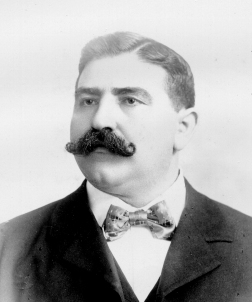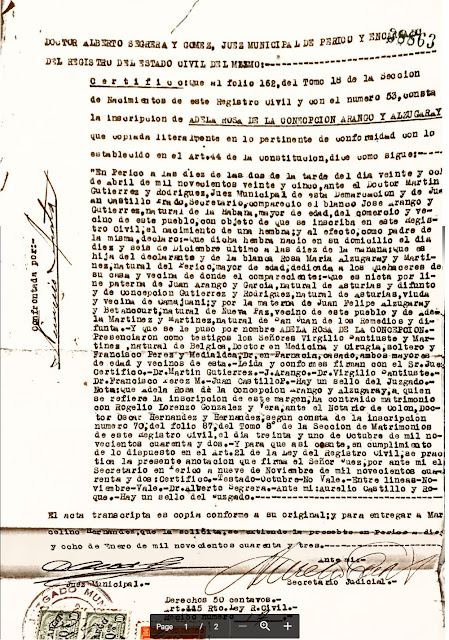The Basics - 02: Spanish Surnames
1. Maiden Names: Spanish women (usually) retain their maiden names upon marriage. This custom is a real boon to genealogists, because the woman’s records are (almost always) found under her maiden name, even her death record! Occasionally, in Spain, when the wife’s family was of higher social status than the husband, he would adopt her surname! This was especially true if she was the only heir and her father wished to carry on his name.
2. Double Surnames: Spanish custom dictates that people use a double surname. As an example, my father was Cándido Arango Estrada (or Arango y Estrada - the “y” meaning “and” in Spanish). This means that his father’s surname was Arango and his mother’s surname was Estrada. It would be terribly impolite to call him Mr. Estrada.
My grandfather was Cándido Arango García. So, the folks who met him for the first time would know that, “Oh, yes! He’s the son of the Arango boy who married the García girl.” Another real boon to genealogists! (Cándido Arango Garcia was born 4 August 1866 in Salamir, Asturias, Spain and died 22 September 1914 in la Habana, Cuba. He was buried at the Cementerio de Cristobal Colón.)
3. Single Surname: So what if there is only one surname? Does that mean that the child was illegitimate? Perhaps. Or perhaps for convenience (as in a newspaper article), it was easier to use just one.
4. Speaking of legitimacy: There are three kinds of children in Spanish-speaking countries: Legitimate (those born of a legal marriage), Illegitimate, and “Natural.” This last is unusual to many of us. It reflects the reality that men often had children with those to whom they were not legally married. If (for whatever reason), the father chose to recognize that the child was his, then that child was considered a “natural” child of his father.
Complete baptism, marriage, and burial records will usually indicate that the child was legitimate, if this was indeed the case. If the child was not legitimate, the father’s name was usually omitted. If the child was “natural,” both parents’ names would be given.
Many churches have a form which the secretary will use to extract the vital information from a record - and that form usually does not state the issue of legitimacy. So, when you request a church document, ask for a copy of the complete record. You probably will receive only the extract, because church offices are frequently staffed by volunteers who come in only once every week or two. But it never hurts to ask.
2. Double Surnames: Spanish custom dictates that people use a double surname. As an example, my father was Cándido Arango Estrada (or Arango y Estrada - the “y” meaning “and” in Spanish). This means that his father’s surname was Arango and his mother’s surname was Estrada. It would be terribly impolite to call him Mr. Estrada.
My grandfather was Cándido Arango García. So, the folks who met him for the first time would know that, “Oh, yes! He’s the son of the Arango boy who married the García girl.” Another real boon to genealogists! (Cándido Arango Garcia was born 4 August 1866 in Salamir, Asturias, Spain and died 22 September 1914 in la Habana, Cuba. He was buried at the Cementerio de Cristobal Colón.)
3. Single Surname: So what if there is only one surname? Does that mean that the child was illegitimate? Perhaps. Or perhaps for convenience (as in a newspaper article), it was easier to use just one.
4. Speaking of legitimacy: There are three kinds of children in Spanish-speaking countries: Legitimate (those born of a legal marriage), Illegitimate, and “Natural.” This last is unusual to many of us. It reflects the reality that men often had children with those to whom they were not legally married. If (for whatever reason), the father chose to recognize that the child was his, then that child was considered a “natural” child of his father.
Complete baptism, marriage, and burial records will usually indicate that the child was legitimate, if this was indeed the case. If the child was not legitimate, the father’s name was usually omitted. If the child was “natural,” both parents’ names would be given.
Many churches have a form which the secretary will use to extract the vital information from a record - and that form usually does not state the issue of legitimacy. So, when you request a church document, ask for a copy of the complete record. You probably will receive only the extract, because church offices are frequently staffed by volunteers who come in only once every week or two. But it never hurts to ask.



Comments
Post a Comment